
Ikebukuro is known as one of the best downtown areas in Tokyo. Once the tallest skyscraper in Japan, Sunshine 60 is a landmark and a lively gathering of commercial and leisure facilities.
Ikebukuro is also a student district with many universities and vocational schools. To satisfy their appetites, ramen shops need to be reasonably priced and offer delicious noodles. That's why Ikebukuro's ramen shops are high-level, and only the most competitive restaurants can survive.
Here are three of Ikebukuro's most popular ramen shops.
1. Karashibi Miso Ramen Kikanbo: A spicy taste that you can only find here!
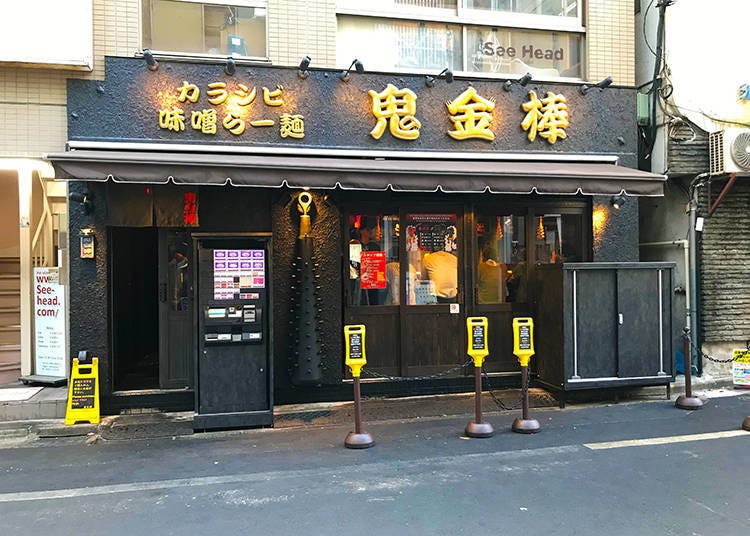
Karashibi Miso Ramen Kikanbo is a 5-minute walk from Ikebukuro Station. “Karashibi” is a coined by the shop and means “you can taste the sensation of tingling and numbness on your tongue at the same time.”
The secret is in the chili and spices used. “Kara” is an original blended of six carefully selected peppers and spices. “Shibi” is a fragrant oil made by adding flavored vegetables to Wakayama grapes and Sichuan pepper and then heating them at low temperature. Spicy miso ramen noodles have reportedly become less common, but are now popular among foreign tourists. Since the opening of the first store in 2009, there are now six stores – three in Tokyo and three in Taipei.
“Kara” and “Shibi” can be ordered in 5 levels of spiciness. If you like spicy foods, please try the hottest level!
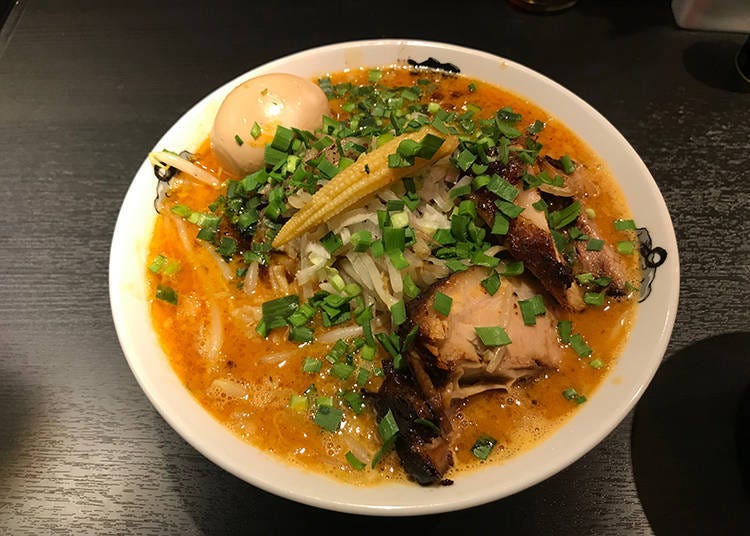
One of the popular menu items, “Special Karashibi miso ramen” (1,100 yen including tax) includes pork chashu, bean sprouts, and eggs. For the first try, both “Kara” and “Shibi” were ordered at “Normal” levels. Both can be ordered by selecting from 5 levels: “Without,” “Less,” “Normal,” “Increase,” and “Oni increase (plus 100 yen).”
There are also combinations such as “Uncolored” and “Shibi Oni Increase” – 25 combinations in all – and repeat visitors have plenty of options to find what suits them. The soup is available with meat or seafood stock, and then miso (seasoned Japanese fermented soybean) and spices are added.
The process is handled carefully to make the soup spicy, but without sacrificing taste. For meat stock, the main Kanda shop offers pork bone and chicken, while the Ikebukuro store uses only pork bone.

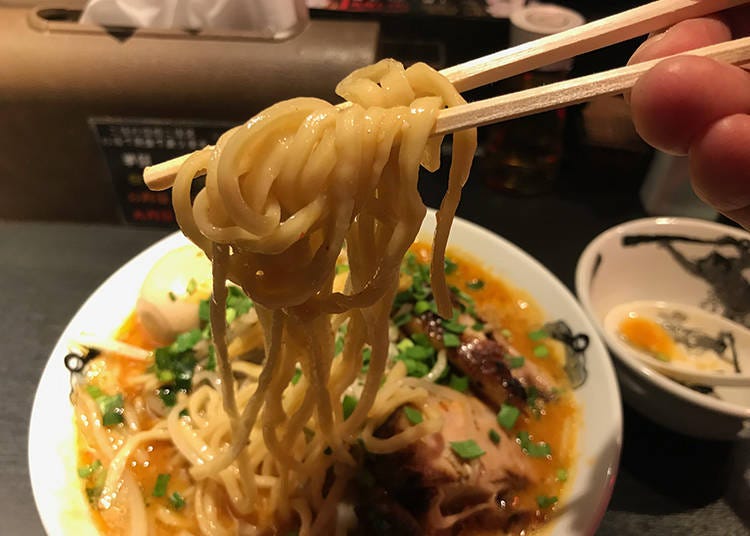
Another notable feature is the mixed noodles. In general, ramen is prepared using one thickness of noodles, so there is no unevenness when boiling them. Kikanbo mixes medium-thick, medium-thin, and thin noodles, so you can enjoy different textures with each bite. The different firmness of each kind of noodles and how they intermingle with the soup and spices create an amazing taste from the first bit to the last.
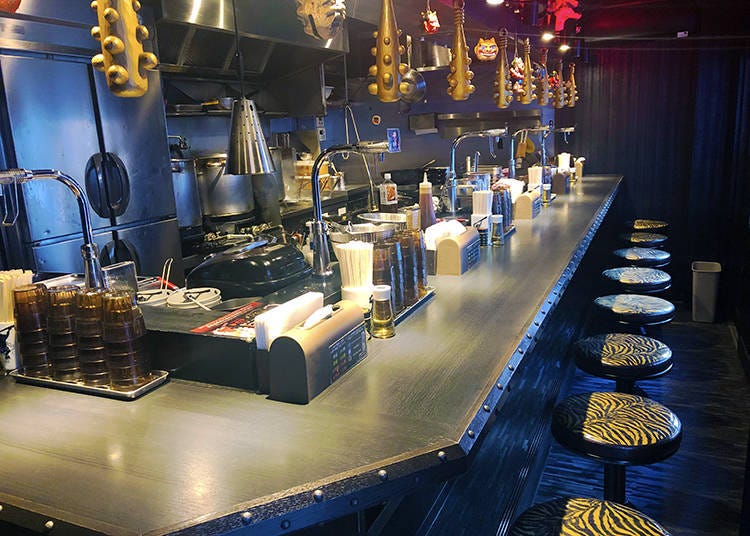
The name “Kikanbo” means “demon gold rod.” The demon is a monster with body like a human, but with horns and wears a tiger skin loincloth. Symbolizing strength and fear, they are said to become even stronger when carrying a golden rod. One available topping, “Young Corn” is meant to resemble a golden rod. The shop is also decorated in a fun demon motif with Japanese drums for background music.
-
KARASHIBI MISO RAMEN KIKANBO IKEBUKUROTENカラシビ味噌らー麺 鬼金棒 池袋店
- Address 1-13-14, Higashi Ikebukuro, Toshima-ku,Tokyo, 170-0013
-
Nearest Station
Directions: 5-minute walk from the east exit of Ikebukuro Station on the JR Line, Marunouchi Line, Yurakucho Line, Fukutoshin Line, Seibu Ikebukuro Line, Tobu Tojo Line
- Phone Number 03-5396-4202
Hours: 11:00 - 22:00
Closed days: None
2. Kyushu Jangara Ramen: A long-cherished store that popularizes pork bone ramen in Tokyo
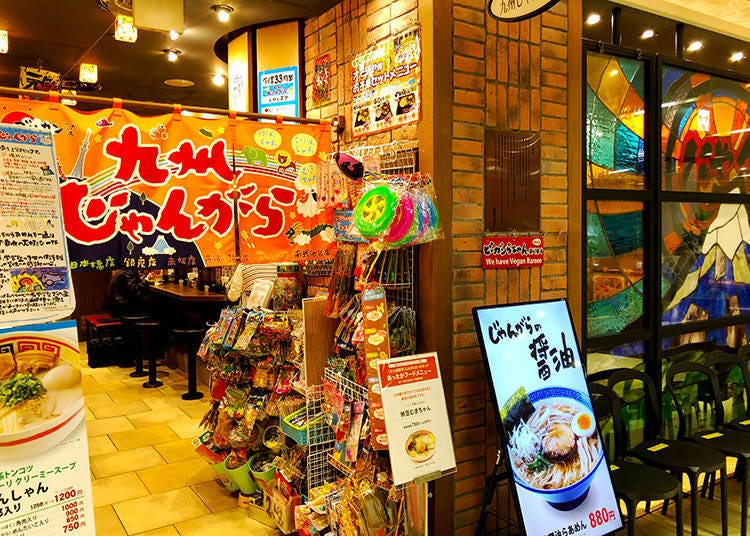
Kyushu Jangara Seibu Ikebukuro is a ramen shop located in the restaurant area of Seibu Department Store, directly connected to Ikebukuro Station. It’s well-known for tonkotsu (pork bone) ramen which is popular even overseas.
While the Ikebukuro branch opened in 2011, the first Tokyo store opened in 1984 in Akihabara. At that time, familiar soy sauce ramen with a light chicken base was familiar in Tokyo, and few Kyushu pork bone ramen shops were available.
Pork bone ramen has a unique is characterized by a richness not found in soy sauce ramen, and the cloudy soup is made by simmering pork bones for a long time. Kyushu Jangara Ramen quickly became very popular, and it has long been a leader in the ramen industry as become synonymous with “ramen you’ll line up for.”
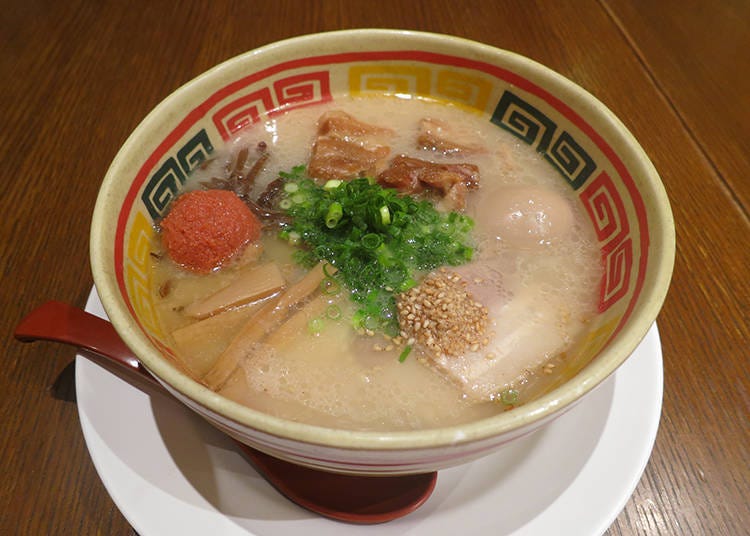
Their signature dish is “All In” (1100 yen including tax). “All in” is a unique expression of Jangara Ramen which means all toppings are added to the ramen. It includes three slices of simmered pork, seasoned boiled egg, seasoned bamboo shoots, mentaiko, chashu pork, kikurage, leeks, and sesame.
Kyushu Jangara soup uses not only pork bone, but also chicken bones and vegetables, and has a mild taste without the unique smell of pork bones. Jangara also offers pork-only soup, as well as soup featuring black garlic oil (mayu) soup.
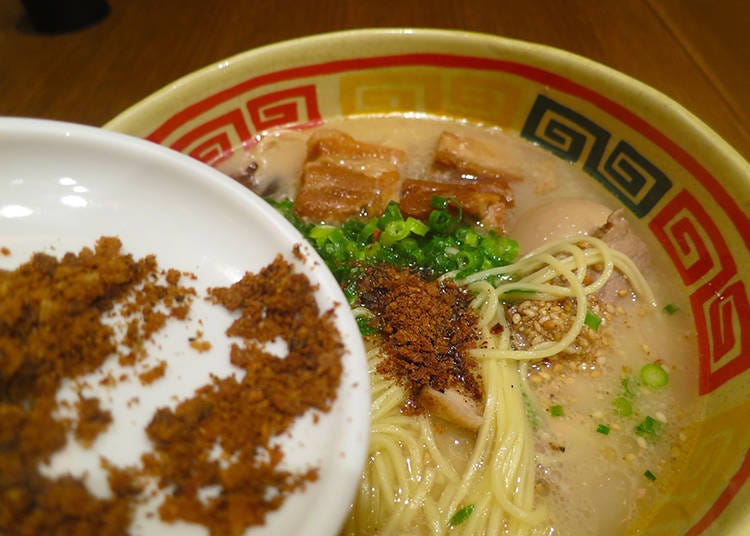
Another menu item, “Kapitan garlic” (60 yen including tax), is fried garlic served as an additional condiment not included in “All In.” The term “kapitan” finds its origins in the era when Japan was till closed to most of the world, aside from trade with the Netherlands. Dutch leaders in Nagasaki’s “Dejima” area were referred to as “captain.” Kyushu Jangara Ramen is characterized by the the incorporation of elements of foreign culture everywhere.
The culture of Nagasaki, is further represented in the menu’s combination of Chinese and Western cuisine and toppings like, “kakuni,” which is often called Nagasaki’s traditional “table dish.” Nagasaki was once the stage of intense Christian repression, that aspect of Nagasaki’s cultural history is reflected with the restaurant’s use of stained glass décor.
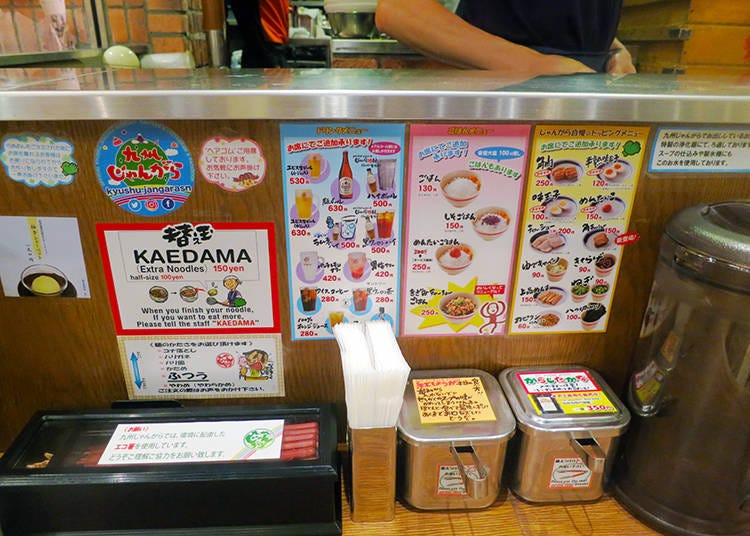
Tonkotsu ramen has its own unique culture called “kaedama,” which means you can order a second serving of noodles to add to your leftover soup. In addition to an English explanation of “kaedama” for foreign patrons, menus are available in English, Chinese, Korean, and Thai. For vegans “Japanese-style Yuzu Shio Vegan Ramen” (1000 yen including tax) is a suitable menu item
-
KYUSHU JANGARA RAMEN SEIBU IKEBUKUROTEN九州じゃんがら 西武池袋店
- Address Seibu Ikebukuro Honten 8 Kai, 1-28-1, Minami Ikebukuro, Toshima-ku, Tokyo, 171-0022
-
Nearest Station
Directions: Directly connected to JR Ikebukuro Station East Exit, Ikebukuro Seibu Department Store 8F
- Phone Number 03-3981-5188
Hours: 11:00 - 23:00 (Opens at 10:30 on Sundays and holidays)
Closed days: None
3. Chisoumen Mamiana: Open for 10 years in a competitive area - A shop where you’ll not mind lining up for the rich pork bone noodles
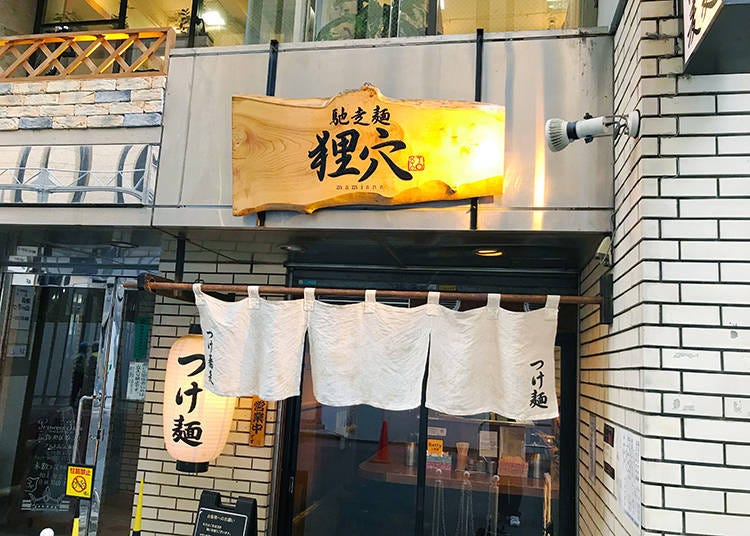
The area outside Ikebukuro Station’s East Exit is known as a ramen battlefield. In particular, many popular shops can be found in the area near Toshima Ward Office. Chisomen Mamiana opened in 2009 and always has a line of customers outside waiting to enter. Their specialty is “tsukemen,” which has separate soup and cold noodles. The noodles’ flavor is similar to standard ramen, but since they’re cold, they’re refreshing to eat even on hot summer days.
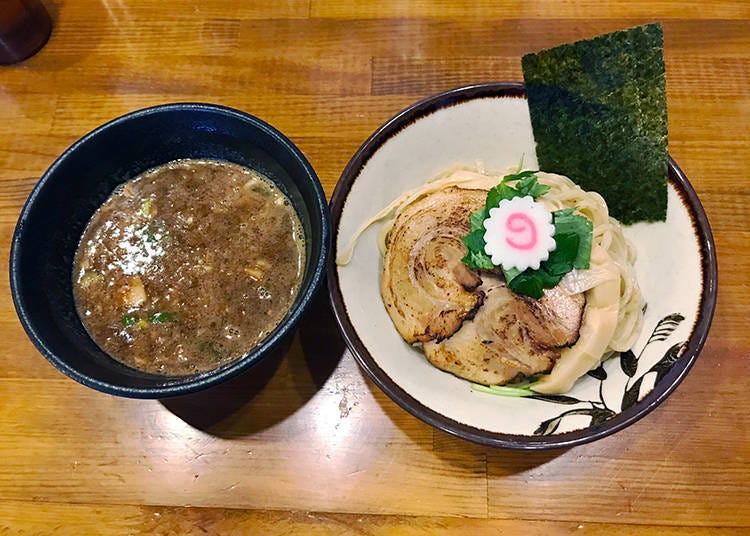
The signature dish is “rich seafood noodles,” with a rich soup base made with pork bones, chicken breasts, and seafood dashi. While boiled bonito is the typical main ingredient dashi, Chisomen Mamiana uses niboshi (dried sardines) dashi. Niboshi is more popular among Japanese ramen fans because it has a more stronger fish flavor than bonito dashi. However, it can be slightly bitter, so it may not be to the liking of overseas visitors. The pork fragrant, and two large pieces are included.
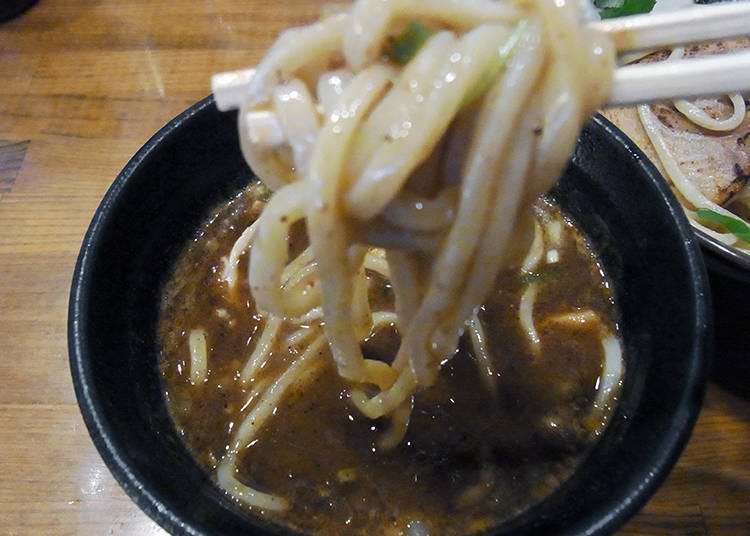
The noodles here are a must-eat. As thick as udon noodles, they take 10 minutes to boil. If you look closely, you can see some of the brown whole grain flour from which they are made. Whole grain flour is characterized by the fact that both skin and germ are used when wheat is ground. Chisomen Mamiana uses whole wheat flour made from 100% Hokkaido wheat. Standard portions are about 220 grams of noodles, but larger 330g and 440g servings can be ordered.
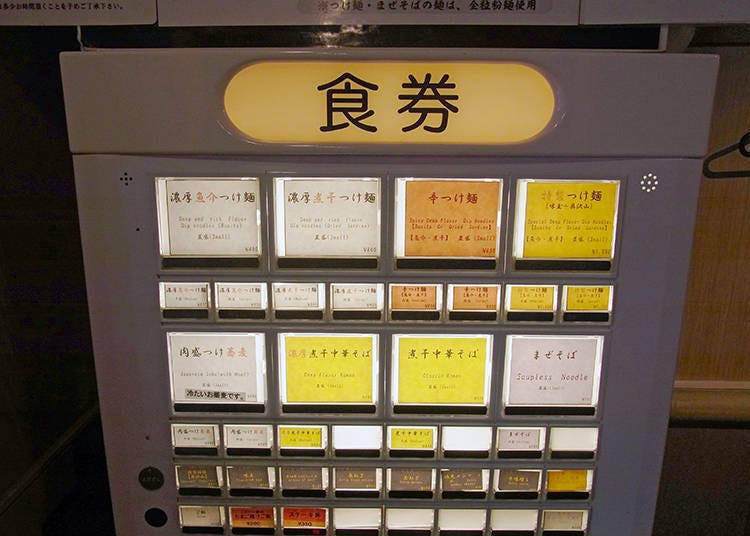
The shop uses the ticket system, by which you purchase a ticket for the menu item you want and then hand it to your server. The English is conveniently printed on the ticket machine's buttons.
-
CHISOUMEN MAMIANA馳走麺 狸穴
- Address 1-32-2, Higashi Ikebukuro, Toshima Ku, Tokyo, 170-0013
-
Nearest Station
Directions: 5-minute walk from the east exit of Ikebukuro Station on the JR Line, Marunouchi Line, Yurakucho Line, Fukutoshin Line, Seibu Ikebukuro Line, Tobu Tojo Line
Hours: 11:00 - 22:00 (Open until 21:00 on Sundays)
Closed days: Tuesday
*Prices and options mentioned are subject to change.
*Unless stated otherwise, all prices include tax.
Popular Tours & Activitiess
Recommended places for you
-
Ad

5 Recommended Wagyu Yakiniku Restaurants in Tokyo: Signature Dishes, Premium Beef, and Secret Sauces
-

Farewell, Heavy Suitcases! Keisei Ueno’s New Service Makes Your Last Day in Tokyo Totally Hands-Free
by: Guest Contributor
-

A New Tokyo Landmark Is Coming in 2026, and It's Built for Modern Travelers
by: Guest Contributor
-

PokéPark KANTO Is Finally Open! Tokyo's New Pokémon World Starts Before You Even Arrive (2026)
by: Guest Contributor
-
Ad

What Makes Japanese Yakiniku So Darn Good? Guide to Cuts, Heat, and Wagyu Know-How
-

Where to Buy a Japanese Kitchen Knife? Why Travelers Choose MUSASHI JAPAN's 14 Stores in Tokyo, Kyoto, and Nara
by: Guest Contributor
-

Tokyo $10 Food Challenge: 4 Tasty Asakusa Specialties You’ll Want to Try Now
by: Miyu Shimada
-

Meiji Shrine (Meiji Jingu): Exploring the Sacred Sanctuary of Peace in Bustling Tokyo
-

Spending Wonderful Time Alone in Shibuya - Free Cosmetics and a Hundred-Yen Bus!
-

Tokyo Ramen Street: 3 Popular Shops at Tokyo Station's Noodle Paradise!
-

2022 Ramen Trends in Japan - According to a Ramen Master
by: Miyu Shimada
-

What to Pack for Japan: 8 Essential Things for a Hassle-Free Trip
- #best ramen tokyo
- #what to buy in ameyoko
- #what to bring to japan
- #new years in tokyo
- #best izakaya shinjuku
- #things to do tokyo
- #japanese nail trends
- #what to do in odaiba
- #onsen tattoo friendly tokyo
- #daiso
- #best sushi ginza
- #japanese convenience store snacks
- #best yakiniku shibuya
- #japanese fashion culture
- #best japanese soft drinks


















